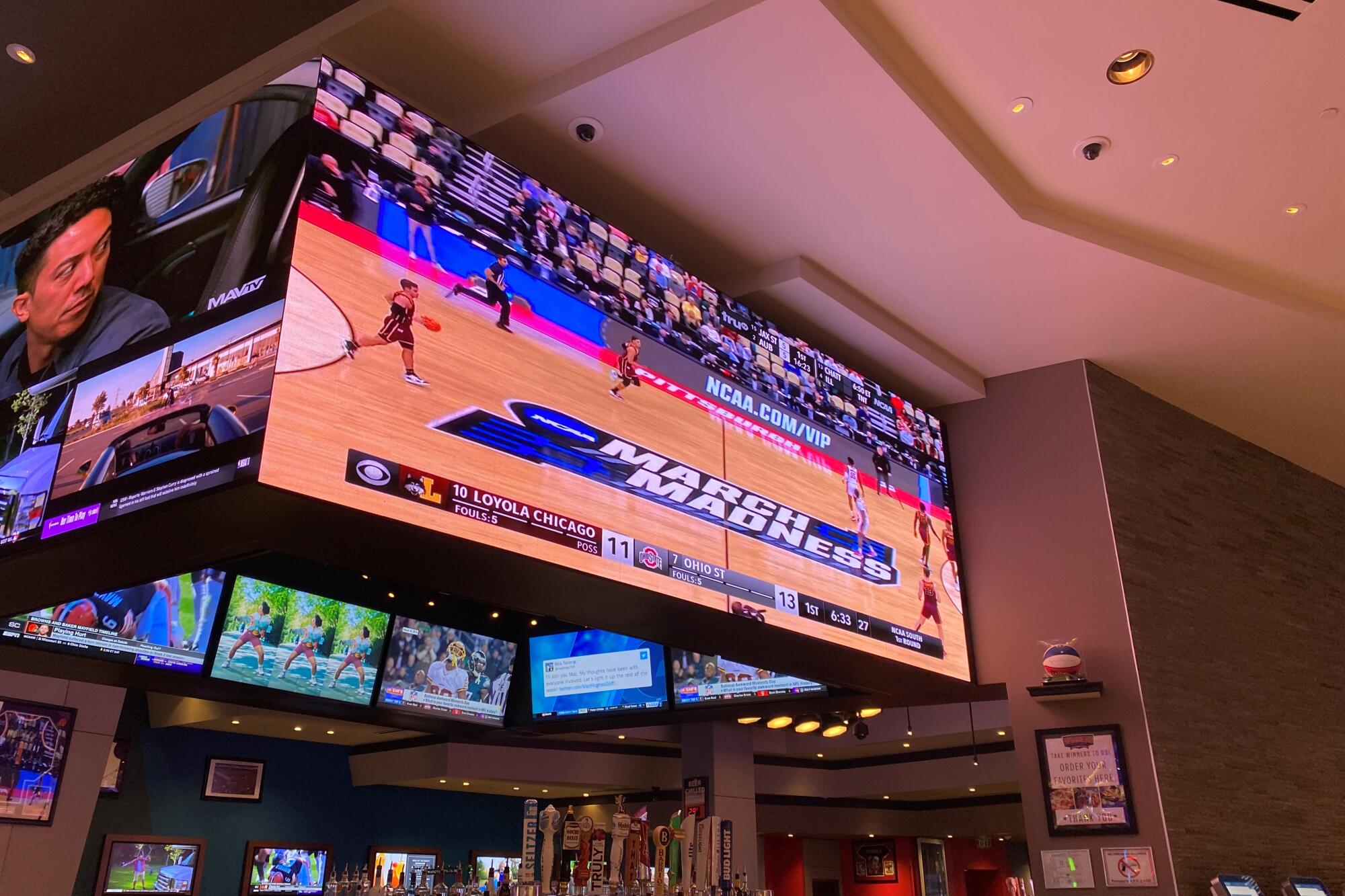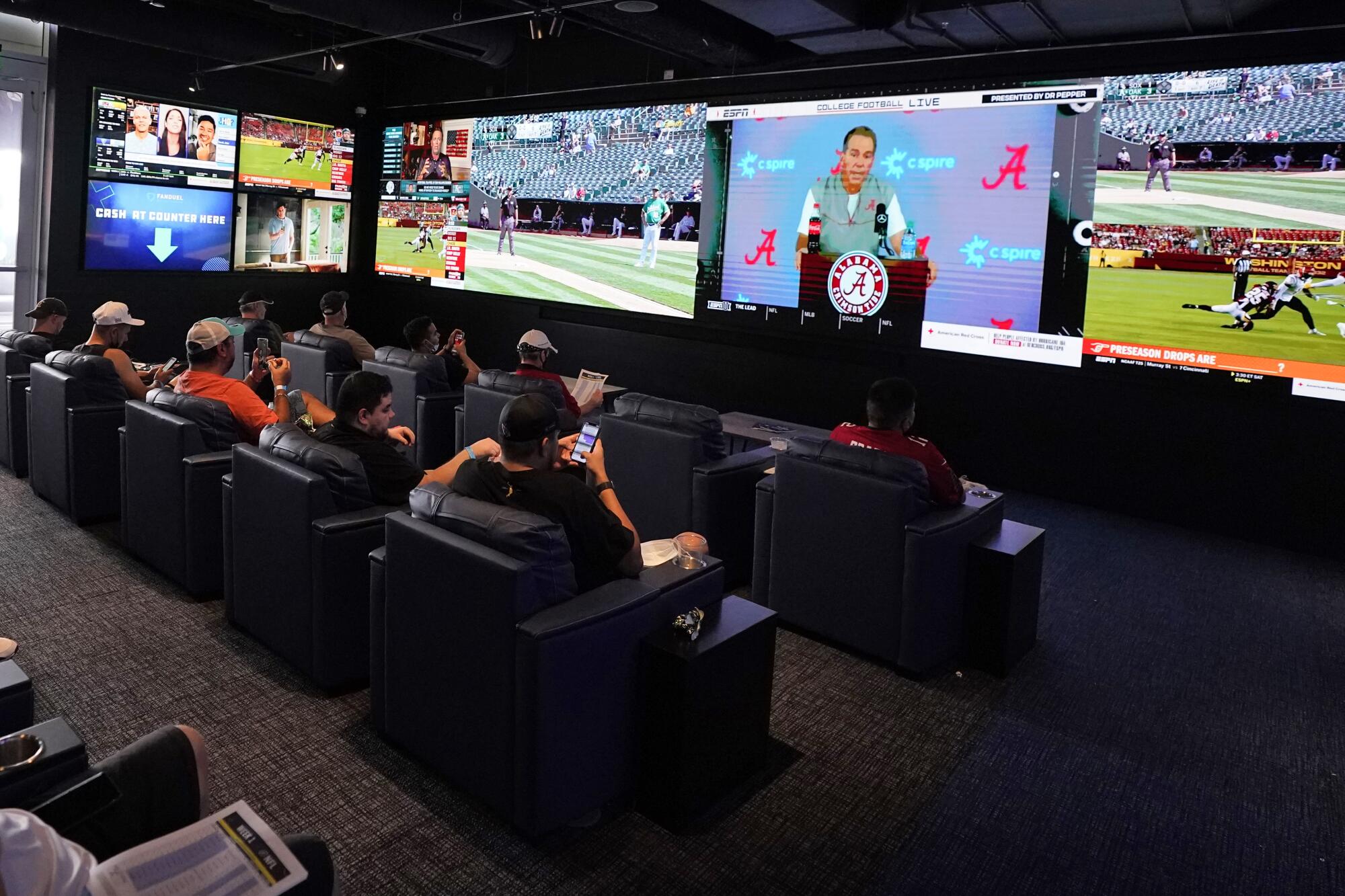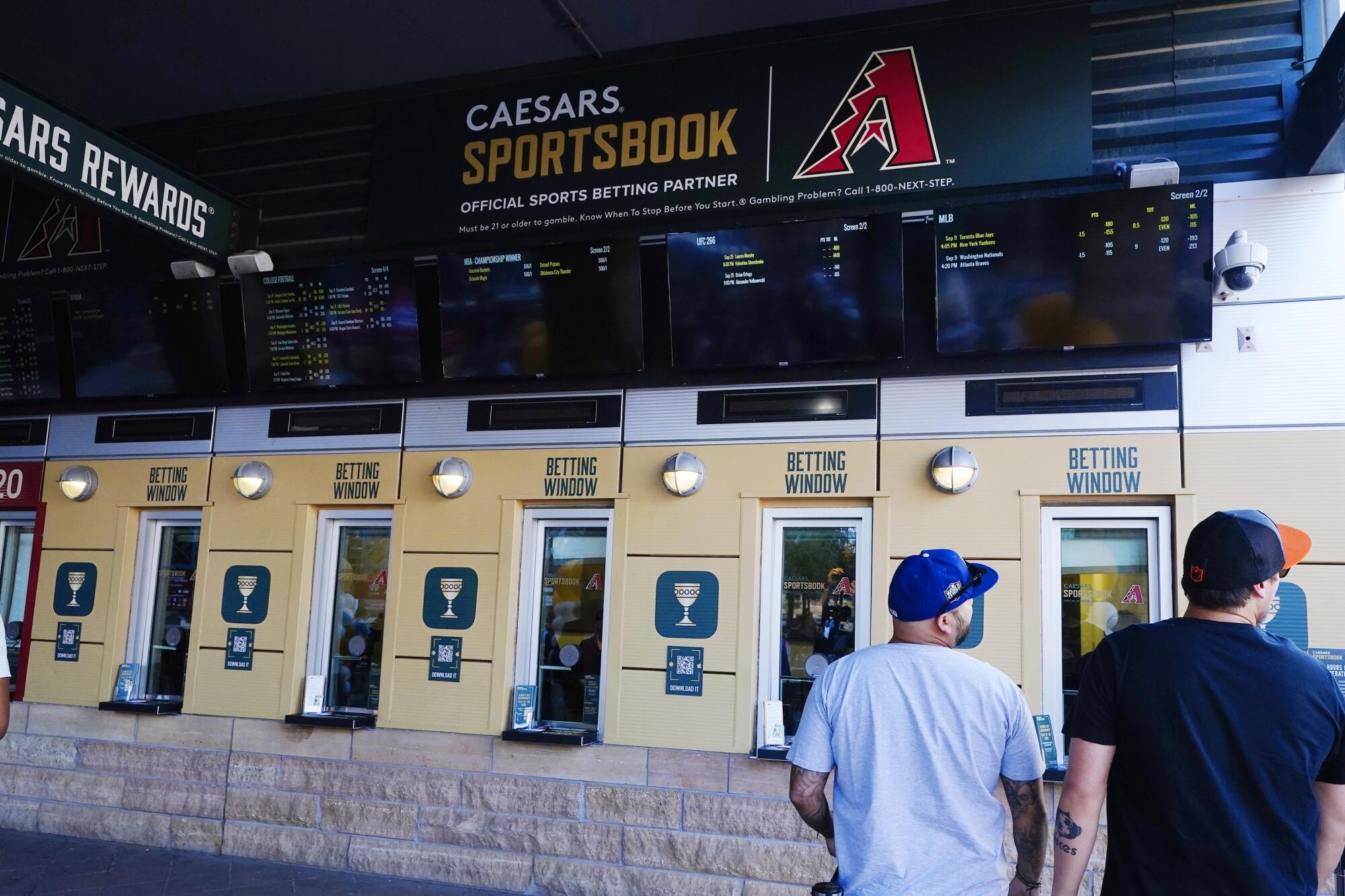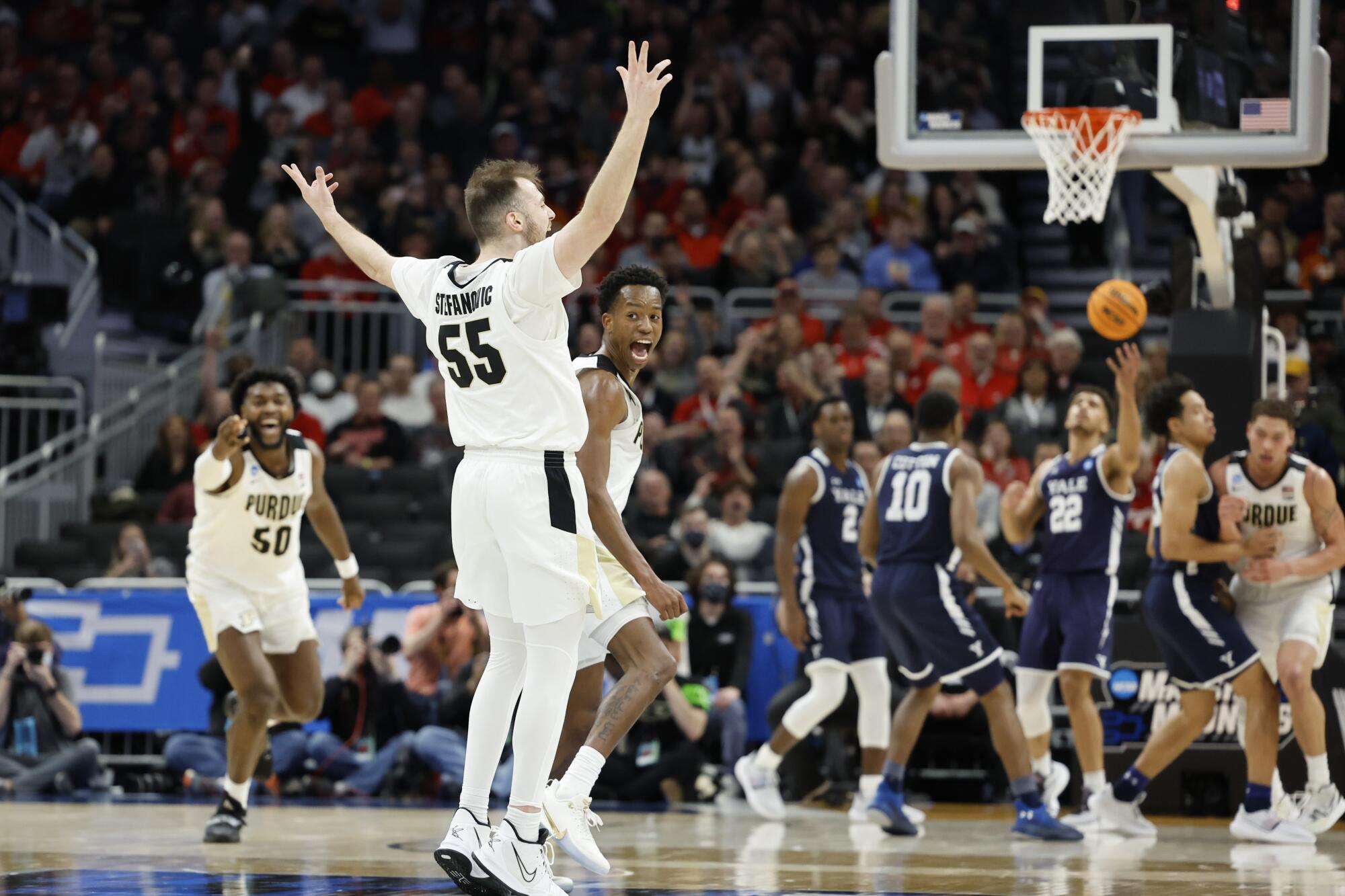
- Share via
PHOENIX — It was 9:30 a.m. on a Friday, the morning after St. Patrick’s Day, and a man in a yellow dress shirt and brown tie was going berserk.
“Make it 10 again!” he yelled at one of the umpteen television screens around him. “Make it 10 again! No more easy baskets!”
Kevin Burkeen’s voice boomed through the hushed area, muting the persistent din of slot machines in the background. Seconds later, Ohio State scored a bucket to take a 31-21 lead over Loyola Chicago. Burkeen was shouting again.
“Double digits! I told you!”
Burkeen, 55, enjoys gambling on sports. Really enjoys it. He enjoys it so much he said he once moved three hours north to Bullhead City so he could frequently bet on games legally across the Colorado River in Nevada.
“I got a job at Denny’s just to have a job,” he said.
Burkeen doesn’t live in Bullhead City anymore. He said he moved back to the Phoenix area once sports gambling was legalized in Arizona. And he’s often at a sportsbook when he isn’t driving people for his limousine company.
On this day, after dropping off a client at a car auction nearby, he was inside Desert Diamond Casino, five miles from the Dodgers’ spring training home in the West Valley. He was there to place bets on the NCAA men’s basketball tournament, living a gambler’s dream.
Several people were plopped down in La-Z-Boys stationed in front of a wall of televisions. Occasionally, a few would place bets at the kiosks along the wall. Employees in referee shirts, á la Foot Locker, roamed the area. Everyone was required to wear masks. The bar at the sportsbook hadn’t yet opened; the drinks would start pouring at noon.
“We finally got sports betting here, bro,” Burkeen said. “It’s about time.”
A year ago, sports gambling in Arizona remained illegal, pushed to underground bookies, whose illicit business always thrived. If you wanted to legally wager on a sporting event, you had to leave the state.

The final roadblock to legalization was cleared last April when Gov. Doug Ducey signed the bill into law. Operations launched in September. By December, Desert Diamond Casino had eight kiosks running in its West Valley location. In January, retail, over-the-counter betting opened in the casino.
“We entered the sports betting world methodically,” said Treena Parvello, a spokesperson for Desert Diamond Casino. “We’re taking a phased approach.”
Arizona crashed a movement that has swept through the country since the federal ban on sports gambling — in states other than Nevada — was overturned in 2018.
Today, sports wagering is legal in 30 states and the District of Columbia. Sportsbooks in the United States generated $4.3 billion in revenue on sports wagers in 2021. It is seemingly a matter of time before the remaining 20 states tap into the jackpot.
In California, the question is not only when sports gambling will be legalized, but how it will be permitted. The biggest point of contention is whether online gambling should be allowed.
An initiative that would limit sports betting to in-person wagers at tribal casinos and four horse-racing tracks will be on the statewide ballot for voters in November. Two other measures with substantial backing, but not yet approved for the ballot, would authorize online gambling.
Opponents of online gambling believe restricting people to in-person bets is the responsible approach, deterring people from making irresponsible decisions. The counter argument is that people would continue betting online illegally anyway. Why not safeguard them?
Both sides envision a gold mine.
Analysts project legal sports gambling could generate more than $3 billion a year for California. In 2019, an artist rendering of the latest major renovations at Dodger Stadium — a plaza beyond center field — showed odds on games in Major League Baseball and other professional sports leagues. The possibilities are endless.
Arizona allows online sports betting. It has, so far, permitted 18 online sportsbooks. There are at least 12 live retail sportsbooks. One is operated by Caesars Entertainment at Chase Field, home of the Arizona Diamondbacks.

In the final three months of 2021, $499.2 million was wagered and $459.4 million was paid out in the state, according to the Arizona Department of Gaming. Max Hartgraves, spokesman for the department, said 99% of wagers in the state are placed online.
“The state is receiving more revenue while patrons have protections and guarantees in a legal market,” Hartgraves said.
Pitfalls will always exist. Signs with the state’s problem gambling hotline — (800) NEXT-STEP — are posted in casinos and on billboards. Hartgraves said his department doesn’t have “hard numbers” for people who seek help for problem gambling through the state. He did, however, acknowledge there has been “a slight uptick.”
“There’s a wide variety of measures to mitigate that harm of problem gambling,” Hartgraves said. “Requirements were laid out in the legislation that passed last year. Some of those are the operators themselves have to have a responsible gambling program set up and approved by the department that they have to implement. There’s also a self-exclusion list for sports betting and fantasy sports.”
Three middle-aged friends spent most of their Friday at Desert Diamond, enjoying March Madness with legal sports gambling for the first time.
They ordered lunch and beers while watching the games unfold. Tim M. — one of three men who agreed to an interview on condition of anonymity because of the sensitive nature of the subject — wore a Gonzaga T-shirt because his daughter attends the school. He said he’s been to five of the eight sportsbooks in the Phoenix area. He went to one downtown for the Super Bowl. It was so packed he couldn’t go to the bathroom without losing his seat.
“Why go to Vegas when you can just go to one of these?” Tim M. said. “It’s fun and easy. Everyone who wants to gamble is going to gamble anyway.”
One of his buddies, Andy, a Purdue graduate, wore a Boilermaker T-shirt as Purdue completed a rout of Yale on one of the televisions. He recalled traveling to Las Vegas for March Madness five years ago. He said it was exciting, but the crowds were overwhelming.
“It’s nice here,” he said, looking around.

The sportsbook had become more crowded by noon. Drinks were flowing. Applause and anguish filled the air, each growing louder the later a game went. Burkeen was gone.
Before leaving, he listed his three locks of the day on a piece of paper in front of him. He said he lost $256 on the first full day of the NCAA tournament but won more than $500 in craps. It was a good day. The second day, with another 16 games on the slate, promised to be better. Ohio State coasted to a win.
“What happened to the nun?” Burkeen yelled to three men sitting at a table next to him, referring to Sister Jean, the woman who became Loyola Chicago’s beloved lucky charm during their Cinderella Final Four run in 2018.
One of the men wore a shirt with a message: It’s only a gambling problem if I’m losing.
“She’s still looking good,” another one answered. “She was on TV yesterday. She’s gotta be 95.”
Sister Jean is 102. Good thing they didn’t bet on that.
More to Read
Go beyond the scoreboard
Get the latest on L.A.'s teams in the daily Sports Report newsletter.
You may occasionally receive promotional content from the Los Angeles Times.











